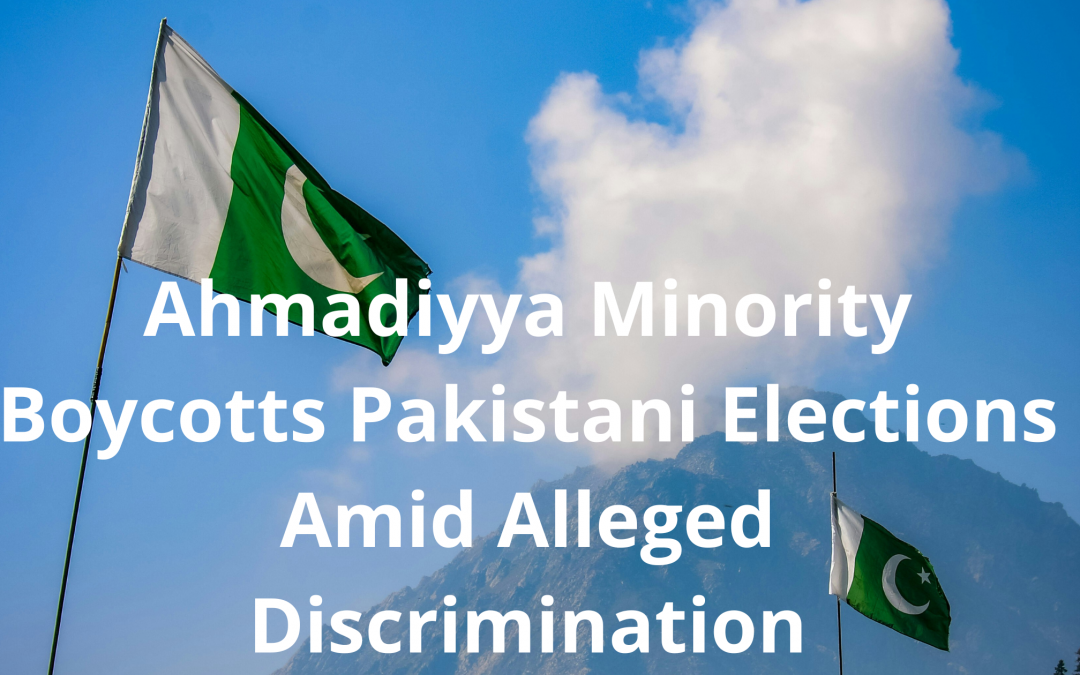Introduction:
In a significant turn of events, members of the Ahmadiyya Muslim minority in Pakistan have decided to boycott the upcoming elections, citing continued discrimination and persecution. This decision highlights the wider issue of religious intolerance and raises questions about the state of democratic values in the country. This article aims to explore the reasons behind the Ahmadiyya community’s boycott and the implications for religious minorities in Pakistan.
Background:
The Ahmadiyya community, a sect of Islam founded in the late 19th century, has long been a target of discrimination in Pakistan. Although Ahmadis consider themselves Muslims, they have faced severe legal and social restrictions due to their beliefs, which are considered heretical by some orthodox Islamic groups. The Pakistani government, under pressure from religious extremists, has enacted laws that further marginalise the Ahmadiyya community, denying them basic rights and recognition.
Boycott amid discrimination:
The recent decision by the Ahmadiyya community to boycott the elections reflects their frustration at the continued discrimination they face. Ahmadis are reportedly banned from openly practising their faith and their places of worship are often targeted. The boycott serves as a protest against the systemic injustices they face, as Ahmadis argue that it is pointless to participate in an electoral process that perpetuates their marginalisation.
Legal discrimination:
The Second Amendment to the Pakistani Constitution in 1974 declared Ahmadis to be non-Muslims, further institutionalising their discrimination. Subsequent ordinances have criminalised Ahmadis for identifying as Muslim or practising Islamic rituals, making them vulnerable to arrest and harassment. The boycotting community claims that until these discriminatory laws are repealed, participation in the elections would legitimise a system that perpetuates their second-class status.
Persecution and violence:
Ahmadis in Pakistan have often been victims of violence fuelled by religious extremism. Mosques and burial sites have been desecrated, and individuals have been targeted solely because of their faith. Such incidents have created an environment of fear, forcing many Ahmadis to live in hiding or seek asylum abroad. The boycott is in part a plea for international attention to the persecution of this religious minority.
International response:
The plight of the Ahmadiyya community in Pakistan has not gone unnoticed by the international community. Human rights organisations and governments around the world have condemned the discrimination and persecution faced by Ahmadis. The boycott is a stark reminder of the need for the international community to exert diplomatic pressure on Pakistan to uphold the principles of religious freedom and protect the rights of minority communities.
Democratic values are at stake:
The boycott by the Ahmadiyya community raises concerns about the state of democratic values in Pakistan. A healthy democracy thrives on the inclusion and participation of all its citizens. The deliberate exclusion of Ahmadis undermines the democratic principles the nation claims to uphold. It is imperative that the Pakistani government addresses the concerns of the Ahmadiyya community and works to create an inclusive and tolerant society.
Dialogue and reconciliation:
Constructive and inclusive dialogue between the government, religious leaders and minority communities is essential to address the underlying issues that led to the Ahmadiyya boycott. Repealing discriminatory laws, ensuring the protection of religious minorities and fostering an atmosphere of tolerance are essential steps towards reconciliation. The Pakistani government must take proactive measures to protect the rights of all citizens, regardless of their religious beliefs.
Conclusion:
The Ahmadiyya community’s decision to boycott the upcoming elections in Pakistan is a poignant reminder of the discrimination faced by religious minorities in the country. The boycott is a desperate plea for justice, equality and the right to worship without fear. It is incumbent upon the international community to stand up for the rights of the Ahmadiyya community and to hold the Pakistani government accountable for its commitment to democratic values and religious freedom. Only through dialogue, legislative reform and a genuine commitment to inclusiveness can Pakistan hope to overcome the shadows of discrimination that have long plagued its society.
More information : https://efe.com/en/latest-news/2024-02-02/minority-ahmadis-boycott-pakistani-elections-citing-alleged-discrimination/




